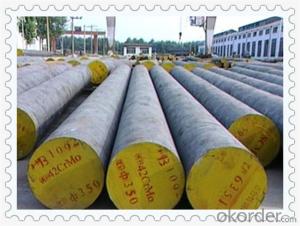AISI 1008 Carbon Steel Round Bars
- Loading Port:
- China main port
- Payment Terms:
- TT OR LC
- Min Order Qty:
- 30 m.t.
- Supply Capability:
- 10000 m.t./month
OKorder Service Pledge
OKorder Financial Service
You Might Also Like
AISI 1008 Carbon Steel Round Bars
Technical Paramenters
Diamater: Ø12mm-Ø650mm
Length: standard 6m,9m,12m, If you need special lengths,please call us.
Surface: Black, polished, grinded
Process: Hot rolled,cold drawn,forged
Inspection: UT test, mill test certificate, third party inspection such as SGS,BV etc.
Packing: In bundle, tied by steel straps, covered with protecting film
Use wooden box, fill with foam to keep the surface from damaging
Description | 1008 steel rould bar | |
Material | ASTM /AISI | 1005,1006,1008,1010,1015,1020,1025,1030,1035, 1040,1045,1050,1055,1060,1065,1070,1080,1084 |
DIN | Ck10,Ck15,Ck22,Ck25,Ck30,Ck35,Ck40,Ck45,Ck50, 30Mn4,40Mn4 | |
Standard | GB/T799,ASTM A29,A36,A108,A321,A575,BS970,DIN1652,JIS G4051 | |
Section shape | Round Other shape such as square,hexagonal,flat,angle | |
Surface | Black, galvanized,grinded, | |
Specifications | Round bar | Diameter: 12mm~650mm |
Angle bar | Size: 3mm*20mm*20mm~12mm*800mm*800mm | |
Square/ bar | Size: 4mm*4mm~100mm*100mm | |
Flat bar | Thickness: 2mm~100mm | |
Width:10mm~500mm | ||
Hexagonal | Size: 4mm~800mm | |
Length | Standard 6m,9m,12m or as required. | |
Trade terms | Payment terms | T/T,L/C,Western Union |
Price terms | FOB,CIF,CFR,EXW | |
Applications | Steel round bar is widely used for all general fabrication and repairs in industrial maintenance, agricultural implements, transportation equipment, ornamental work frame work, braces, supports, shafts,axels,etc. Hot rolled Steel round bars have a slightly grain textured finish. | |
Products Show
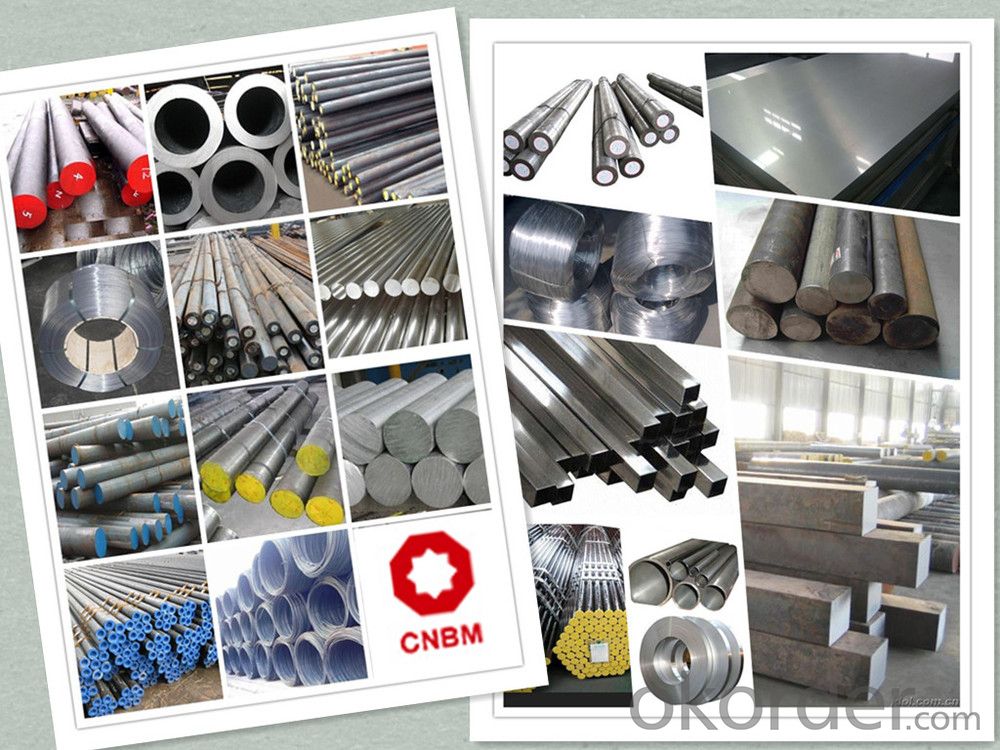
Product Overviews
| Product Name | Typical Grades | Diameter(mm) | Standard adopted |
| Carbon Steel | 20 (1020/S20C/C22) | Ø16-Ø300 |
GB/SAE/JIS/DIN
|
| 40 (1040/S40C/C40) | |||
| 45 (1045/S45C/C45) | |||
| Bearing Steel | GCr9 (51100/SUJ1) | Ø12-Ø250 | |
| GCr15 (52100/SUJ2/100Gr6) | |||
| GCr9SiMn (A485-Gr.1/SUJ3) | |||
Cr-Mo Steel | 20Cr (5120/SCr420H/20Cr4) | Ø12-Ø250 | |
| 40Cr (5140/SCr440/41Cr4) | |||
| 42CrMo(4140/SCM440/42CrMo4) | |||
| Gear Steel | 20CrNiMo | Ø16-Ø600 | |
| 20CrMn(5115/SMnC420/20MnCr5) | |||
| 20CrNiMo(8620/SNCM220/20CrMiMo2) |
Application
| Carbon Steel | Mold bottom, Plastic mold, Construction machinery parts Automobile parts, Security grills, Screens, Construction |
| Bearing Steel | Aerospace, Navigation, Nuclear energy, Chemical industry Electronic information, Petrochemical, Instrument and meter Transportation |
| Cr-Mo Steel | Mechanism & Fasteners gear, Stressed components for vehicles Engines and machines, Parts of larger cross-section |
| Gear Steel | All kinds of gears, Statically and dynamically stressed component for vehicles Engines and machine, Larger cross-section parts, Crankshafts |
Work Shop
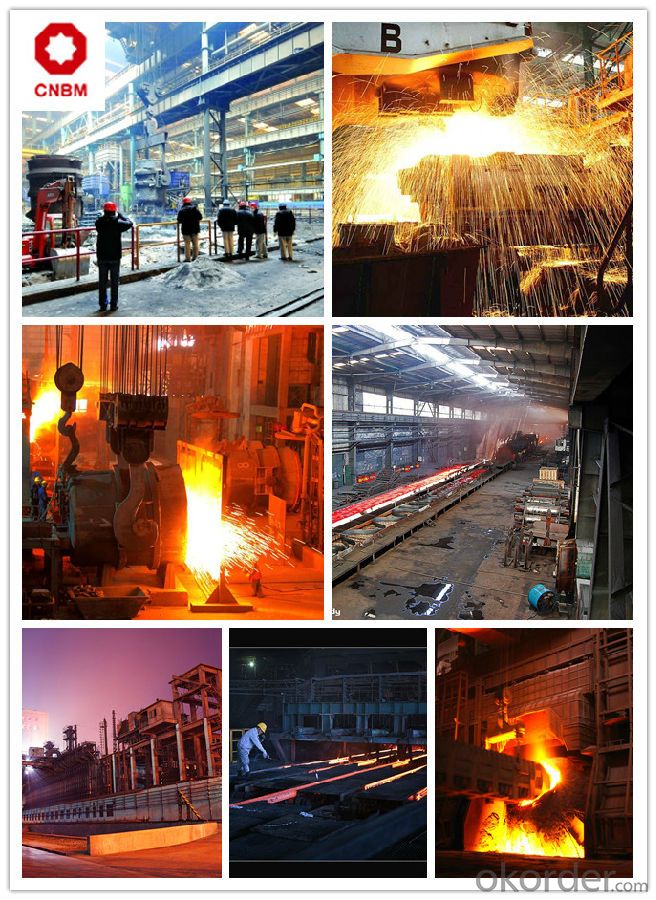
Company Information
CNBM International Corporation is the most important trading platform of CNBM group.
Whith its advantages, CNBM International are mainly concentrate on Cement, Glass, Iron and Steel, Ceramics industries and devotes herself for supplying high qulity series of refractories as well as technical consultancies and logistics solutions.

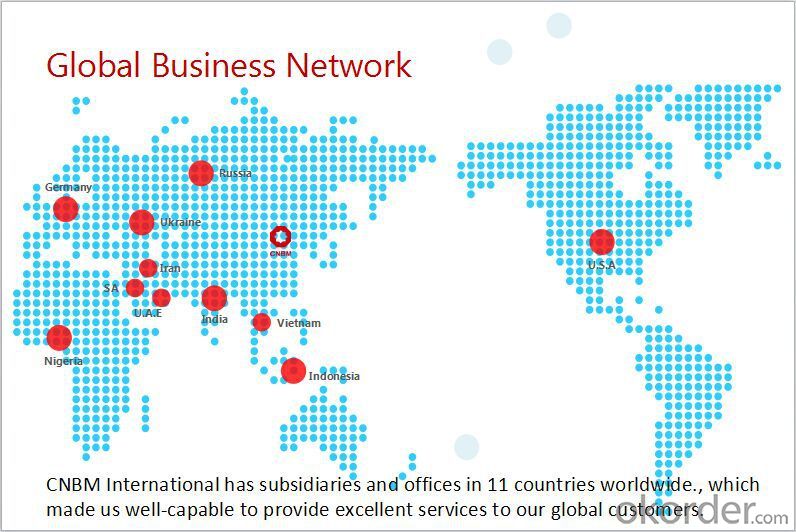
FAQ
1, Your advantages?
professional products inquiry, products knowledge train (for agents), smooth goods delivery, excellent customer solution proposale
2, Test & Certificate?
SGS test is available, customer inspection before shipping is welcome, third party inspection is no problem
3, Factory or Trading Company?
CNBM is a trading company but we have so many protocol factories and CNBM works as a trading department of these factories. Also CNBM is the holding company of many factories.
4, Payment Terms?
30% TT as deposit and 70% before delivery.
Irrevocable L/C at sight.
5, Trading Terms?
EXW, FOB, CIF, FFR, CNF
6, After-sale Service?
CNBM provides the services and support you need for every step of our cooperation. We're the business partner you can trust.
For any problem, please kindly contact us at any your convenient time.
We'll reply you in our first priority within 24 hours.
Packaging & Delivery
1, Packaging: seaworthy package or as required
2, Delivery: 35-45 days or based on quantity
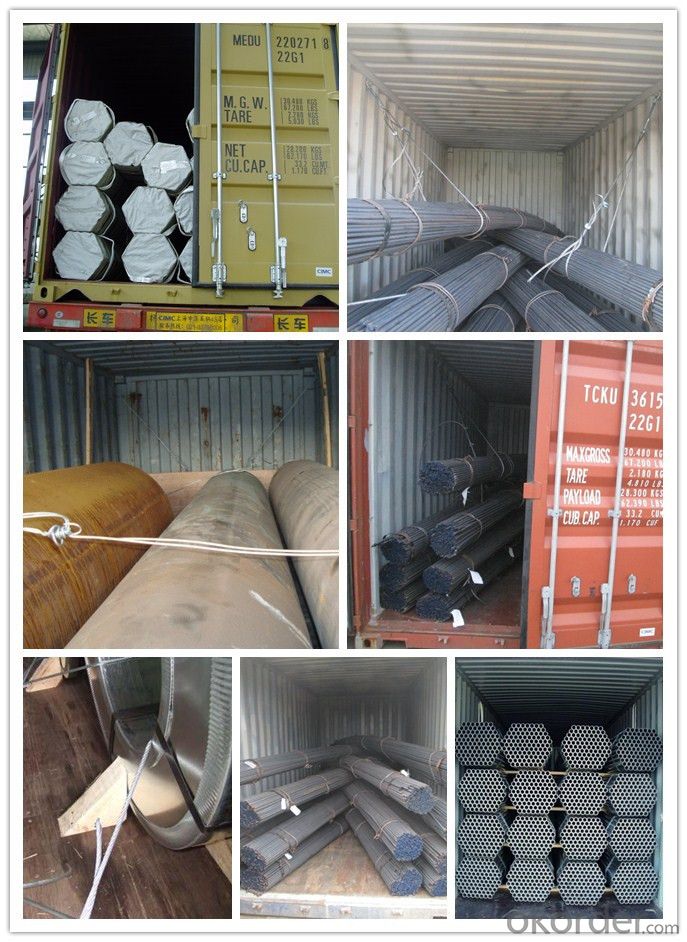
- Q:How do you store excess steel round bars?
- Excess steel round bars can be stored by utilizing proper stacking techniques and ensuring a clean and dry storage area. It is recommended to stack the bars horizontally, with sturdy supports at regular intervals to prevent bending or deformation. Additionally, storing them in a covered area or using protective covers can help prevent corrosion and maintain the quality of the bars.
- Q:Can steel round bars be forged?
- Yes, steel round bars can be forged. Forging is a process in which the steel is heated to a high temperature and then shaped by applying pressure with the help of a forging hammer or press. Steel round bars are often used in forging processes to create various shapes and products such as tools, automotive parts, and machinery components. The high heat applied during forging allows the steel to become more malleable and easier to shape, resulting in a strong and durable final product.
- Q:Can steel round bars be used for making bearings?
- Making bearings can indeed involve the use of steel round bars. However, it is crucial to acknowledge that the suitability of steel round bars for bearing applications relies heavily on the specific type of steel utilized and the manufacturing process employed. Bearings commonly encounter high loads and necessitate qualities such as good wear resistance, low friction, and high durability. For this reason, steel round bars made from top-notch alloy steels, such as chrome steel or stainless steel, are frequently employed in bearing production due to their exceptional mechanical properties. These steel round bars undergo particular heat treatment procedures, such as quenching and tempering, to enhance their hardness, strength, and wear resistance. Moreover, the round bars are usually machined with precise tolerances to ensure proper fit and alignment within the bearing assembly. To guarantee the most optimal performance, reliability, and longevity of bearings under various operating conditions, it is essential to seek advice from materials and manufacturing experts or consult industry standards. This will ensure the appropriate selection of steel round bar material and manufacturing processes for bearing applications.
- Q:What is the difference between hot working and cold working of steel round bars?
- Hot working and cold working are two different methods used to shape and manipulate steel round bars. Hot working involves heating the steel to a high temperature, typically above its recrystallization temperature, and then shaping it through processes such as forging, rolling, or extrusion. This method helps to reduce the hardness and increase the ductility of the steel, making it easier to reshape and form into desired shapes. Hot working also helps to refine the grain structure of the steel, improving its mechanical properties. On the other hand, cold working is performed at or near room temperature without the need for heating the steel. It involves processes like cold rolling, drawing, or bending, where the steel is mechanically deformed to achieve the desired shape. Cold working increases the strength and hardness of the steel while reducing its ductility. It also causes strain hardening, which results in a finer grain structure and improved dimensional accuracy. In summary, the main difference between hot working and cold working of steel round bars lies in the temperature at which the processes are carried out and the resulting effects on the mechanical properties of the steel. Hot working is performed at high temperatures to increase ductility and refine grain structure, while cold working is done at or near room temperature to enhance strength, hardness, and dimensional accuracy.
- Q:What are the advantages of using steel round bars over other materials?
- Steel round bars have numerous advantages compared to other materials: 1. Strength and durability: Known for their remarkable strength and durability, steel round bars are perfect for a wide range of applications. They can withstand heavy loads and resist deformation, making them ideal for structural purposes. 2. Versatility: Steel round bars offer tremendous versatility due to their various sizes, grades, and finishes. They can be easily customized to meet specific requirements, such as different lengths, diameters, and surface finishes. 3. Cost-effectiveness: Steel round bars provide a cost-effective solution when compared to other materials. They are readily available and affordable, thanks to their abundance and efficient manufacturing processes. Moreover, their high strength-to-weight ratio allows for the use of smaller quantities of steel without compromising strength. 4. Corrosion resistance: Steel round bars can be produced with different finishes, including galvanized or stainless steel, which enhances their resistance to corrosion. This enables them to be suitable for outdoor applications or environments where they may encounter moisture or chemicals. 5. Machinability: Steel round bars are highly regarded for their excellent machinability, allowing for easy cutting, drilling, or shaping according to specific design requirements. This characteristic promotes efficient processing and reduces production costs. 6. Fire resistance: Steel is inherently fire-resistant and does not contribute to the spread of flames. Consequently, steel round bars are the preferred choice in applications where fire safety is a concern, such as construction or industrial settings. 7. Recyclability: Steel is highly recyclable, making steel round bars an environmentally friendly option. They can be easily melted down and reused to create new steel products without compromising their properties or strength. In summary, the advantages of using steel round bars over other materials include their strength, durability, versatility, cost-effectiveness, corrosion resistance, machinability, fire resistance, and recyclability. These factors make steel round bars the preferred choice in various industries, including construction, manufacturing, automotive, and infrastructure projects.
- Q:What are the different international standards for steel round bars?
- Steel round bars have several international standards that define their specifications and requirements. Some commonly used standards are as follows: 1. ASTM A36/A36M: This standard focuses on carbon structural steel shapes, plates, and bars of structural quality. It is used in the construction of bridges and buildings through riveting, bolting, or welding. It specifies the chemical composition, mechanical properties, and dimensional tolerances for steel round bars. 2. ASTM A615/A615M: This standard lays down the requirements for deformed and plain carbon-steel bars used for concrete reinforcement. It covers bars with diameters ranging from 6 to 60 mm and provides guidelines for chemical composition, mechanical properties, and bend tests. 3. BS 4449: This British Standard deals with steel bars used to reinforce concrete. It outlines the requirements for carbon steel bars in different grades, such as B500B and B500C. It specifies the tensile properties, chemical composition, and dimensional tolerances for these steel round bars. 4. DIN 17100: This German standard specifies general structural steels, including steel round bars. It provides guidelines for the chemical composition, mechanical properties, and technical delivery conditions for various grades of steel bars. 5. JIS G3101: This Japanese Industrial Standard covers general structure rolled steel used for various applications. It includes steel round bars and defines the chemical composition, mechanical properties, and dimensional tolerances for different grades of steel bars. 6. ISO 6935-2: This International Organization for Standardization standard specifies the requirements for hot-rolled steel bars used for concrete reinforcement. It provides guidelines for the chemical composition, mechanical properties, and dimensional tolerances of steel round bars used in construction. These examples represent only a few of the international standards available for steel round bars. To ensure compliance and quality of the steel round bars used, it is essential to consult the appropriate standard based on the specific application and requirements.
- Q:What is the maximum weight capacity of a steel round bar?
- The maximum weight a steel round bar can hold depends on several factors, including its diameter, length, grade, and type of steel. Steel round bars are available in various sizes and grades, each with its own load-bearing capacity. To determine the maximum weight a steel round bar can handle, you need to calculate its cross-sectional area using the formula: Area = π * (diameter/2)^2. Here, π represents a mathematical constant that is approximately equal to 3.14159. Once you have the cross-sectional area, you can estimate the weight of the bar by multiplying it with the density of the specific steel grade. The density of steel varies based on the grade, but as a general approximation, it is around 7850 kilograms per cubic meter (or 0.00785 grams per millimeter cubed). However, it's important to remember that weight capacity alone may not be the only factor to consider for the safe use of a steel round bar. Other factors like load distribution, applied forces, and the structural integrity of the bar are equally important to ensure safe operation. For accurate weight capacity information for a specific steel round bar, it is recommended to refer to the manufacturer's specifications or consult a qualified engineer or professional who can provide precise calculations based on the specific requirements and characteristics of the steel round bar in question.
- Q:Can steel round bars be used for drive shaft applications?
- Yes, steel round bars can be used for drive shaft applications. Steel round bars are often used for their high strength and durability, making them suitable for transmitting torque and rotational power in drive shafts. However, the specific type of steel and its characteristics should be considered to ensure it meets the required mechanical properties and performance standards for the intended application.
- Q:What is the carbon content in steel round bars?
- The carbon content in steel round bars varies depending on the grade and type of steel being used. Generally, carbon steel round bars contain carbon in the range of 0.08% to 1.5%. Higher carbon content provides increased strength and hardness, but it also decreases weldability and ductility. The specific carbon content in steel round bars is determined during the manufacturing process and can be specified by the customer based on their desired mechanical properties and application requirements.
- Q:What are the different types of steel round bar alloys for improved machinability?
- There are several types of steel round bar alloys that are known for their improved machinability. Some common alloys include free-machining steel alloys such as 12L14, 1215, and 1144. These alloys contain higher levels of sulfur, which helps break up the chips during machining and improves the overall machinability of the steel. Additionally, there are also stainless steel alloys such as 303 and 416, which are specifically designed for improved machinability and are often used in applications where corrosion resistance is required.
1. Manufacturer Overview |
|
|---|---|
| Location | |
| Year Established | |
| Annual Output Value | |
| Main Markets | |
| Company Certifications | |
2. Manufacturer Certificates |
|
|---|---|
| a) Certification Name | |
| Range | |
| Reference | |
| Validity Period | |
3. Manufacturer Capability |
|
|---|---|
| a)Trade Capacity | |
| Nearest Port | |
| Export Percentage | |
| No.of Employees in Trade Department | |
| Language Spoken: | |
| b)Factory Information | |
| Factory Size: | |
| No. of Production Lines | |
| Contract Manufacturing | |
| Product Price Range | |
Send your message to us
AISI 1008 Carbon Steel Round Bars
- Loading Port:
- China main port
- Payment Terms:
- TT OR LC
- Min Order Qty:
- 30 m.t.
- Supply Capability:
- 10000 m.t./month
OKorder Service Pledge
OKorder Financial Service
Similar products
New products
Hot products
Related keywords
